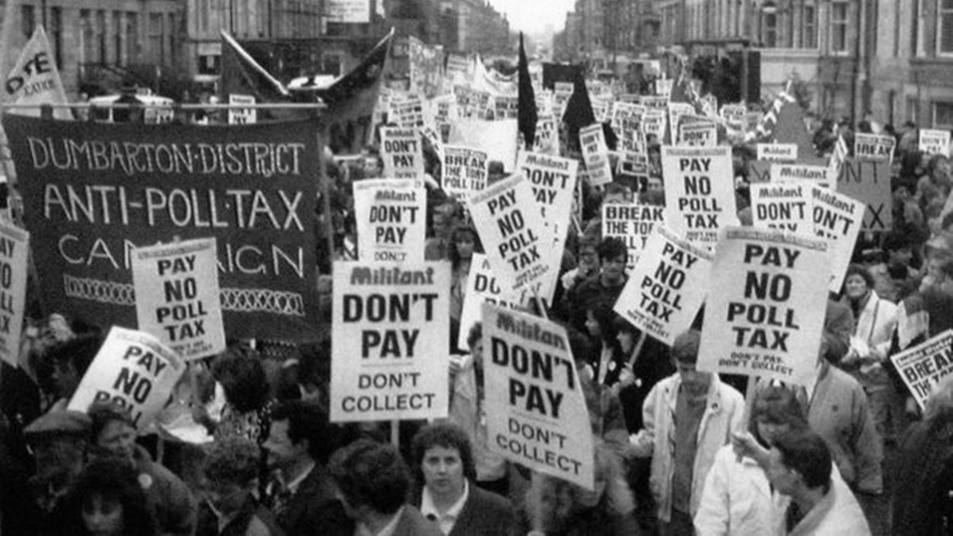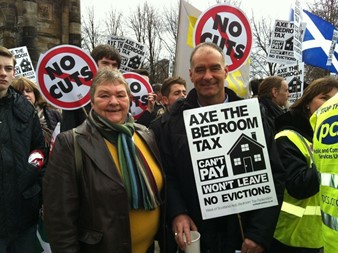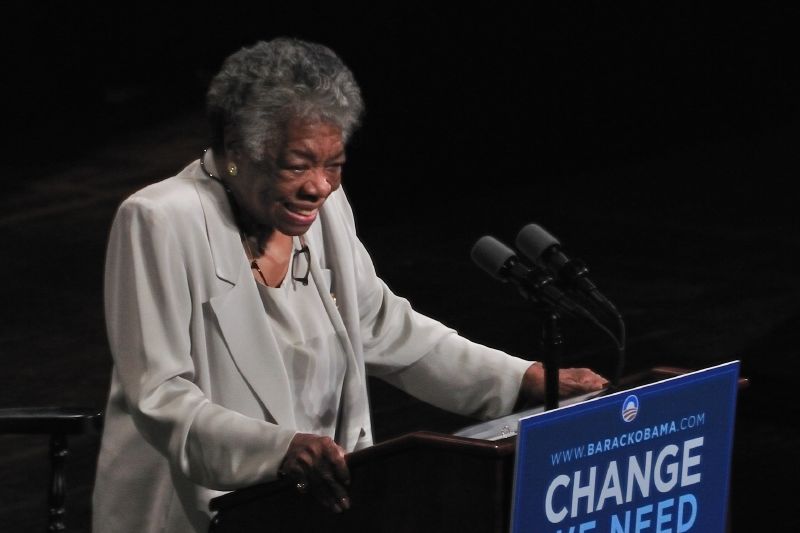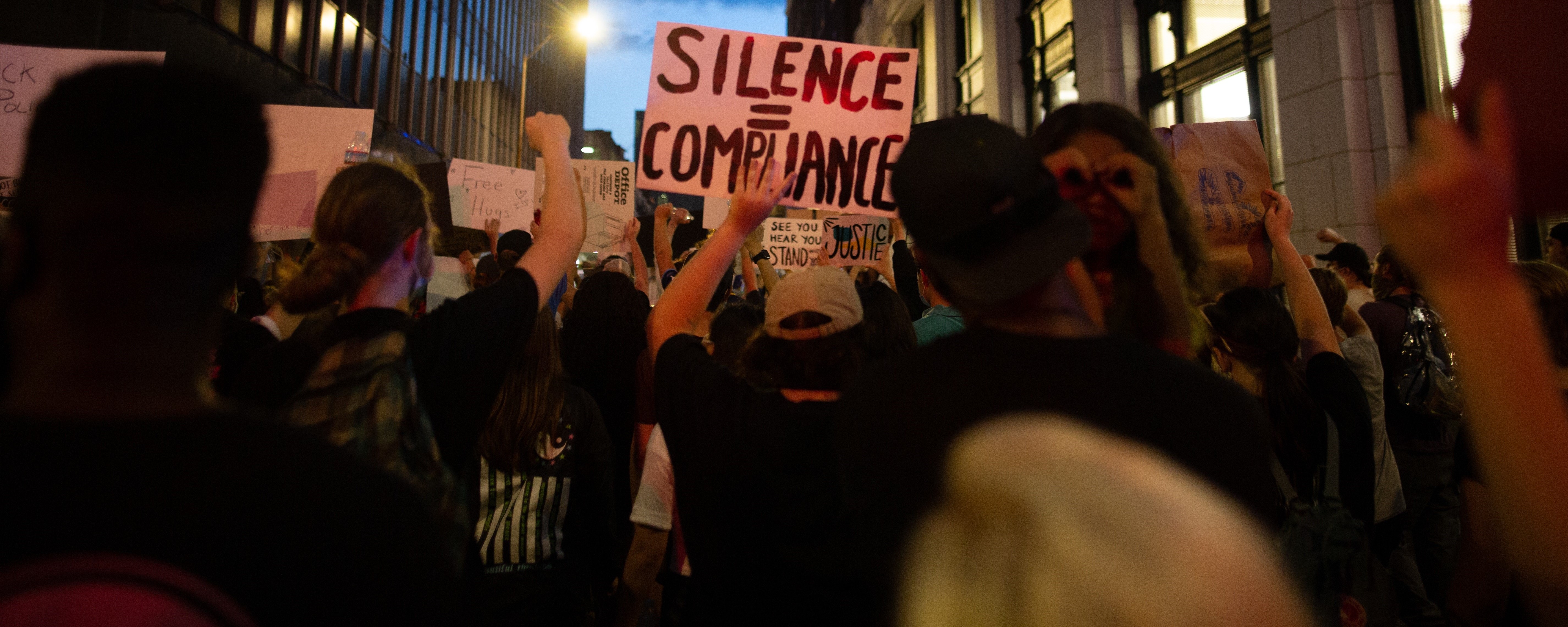Find out about The Open University's Social Sciences courses
This article belongs to the Women and Workplace Struggles: Scotland 1900-2022 collection.

Background
I am a white woman from a working-class background and have lived predominantly in Glasgow and the west of Scotland all my life. I have a strong sense of my own identity as a woman and the implications of this culturally in relation to political and social developments during the course of my life. At certain stages in my life, I can admit to ‘campaigning to overthrow capitalism’ through a political process. This is not a throwaway comment, but one I feel forms a useful part of the analysis as to how I have developed from being a manual worker (bus driver), to a social work practitioner and onto my current academic post as a university lecturer in social work.
Charting my passion for social justice
Since my teenage years I have had a passion for social justice. In the early 1970s I sat with my mother watching a documentary on ‘battered wives’. Erin Pizzy, a woman from the north of England had set up the first women’s refuge, Chiswick Women’s Aid, in 1971. After watching this programme my mother phoned her friend and they discussed setting up a ‘refuge’ in Glasgow. Through collections in pubs and organising fund raising events they secured a property in the Gorbals area of Glasgow.
At this time, the Gorbals was a rundown area with many issues in relation to social deprivation and poverty. The refuge was a large flat in a very run-down building and by today’s standards would not be considered fit for human habitation, but at that time, 1972–73, it was seen as a sanctuary for the women who sought refuge. My evenings and weekends were spent helping out by babysitting the kids.
In the early 1970s we saw the rise of radical women’s movements in the United States and the UK. We saw the introduction of legislation and policy which to some extent liberated women (Introduction of Birth Control, Abortion Act 1967) and legislation which began the ongoing drive towards equality in the workplace (Equal Pay Act, 1970 and the Sex Discrimination Act, 1975).
Trade union activities and social justice
As I entered the workplace, I became active within the trade unions which covered my jobs. I became a shop steward for the Transport and General Workers Union (TGWU) and represented members at disciplinary meetings and helped to shape trade union policy through my involvement within their women’s group. My trade union offered educational courses for stewards and I partook in as many of these as possible.
In reflecting on my own learning journey, I can identify that my engagement with the concepts and theories relating to adult learning has occurred at different levels, ie, personal, professional and philosophical. For example, when I recall my decision to ‘return to learn’, I am now aware of how personal and circumstantial factors at the time affected my access to learning opportunities.
As I have already highlighted, I had taken advantage of education courses provided by my trade union, the TGWU, and used these to build my knowledge base of social and political issues of the time and to enhance my confidence and self-esteem. At this time, I worked in a male-dominated industry as a bus driver for the Scottish Bus Group, based in the Paisley depot. When I started there in 1980/81 I was one of only two women drivers at our garage. My trade union was also very much male dominated.
It was at this point I began to develop an analysis of the social, political and economic trends that affect our personal learning potential. I also had to consider my own learning ability.
From workplace to higher education study
I will never forget my first day at Glasgow Polytechnic (now Glasgow Caldeonian University), better known as ‘the Poly’, on 1 October 1991. I arrived late; all of the new first year social science students were meeting in a lecture theatre. I walked in and there were about 300 students already seated. The member of staff had already started to speak about the course and as I sat there, I thought to myself that I had made a big mistake. I had given up a secure job and for the next three to four years had no idea what lay ahead. The reason for being late was that since 4 AM I had stood with several hundred others at Turnbull Street, close to the centre of Glasgow, to stop the first ever Warrant Sale of goods due to debt accrued by someone for non-payment of their Poll Tax. Some of those there were arrested.
 Anti-Poll Tax march against the Government's community charge Source: Glasgow LiveMy mother and some other activists had prepared for this eventuality by wearing incontinence pads and hiding cigarettes and matches about their person. They had no worries about being arrested but were not prepared to go without their cigarettes! What calmed me down that day was a card my mother had placed, unbeknown to me, in my jacket pocket. She had written that she was really proud of me and wished me every success in my studies. Even today as I write about that day it fills me with pride.
Anti-Poll Tax march against the Government's community charge Source: Glasgow LiveMy mother and some other activists had prepared for this eventuality by wearing incontinence pads and hiding cigarettes and matches about their person. They had no worries about being arrested but were not prepared to go without their cigarettes! What calmed me down that day was a card my mother had placed, unbeknown to me, in my jacket pocket. She had written that she was really proud of me and wished me every success in my studies. Even today as I write about that day it fills me with pride.
During this time, I was politically active as a student. I helped to lead the longest student occupation of any Scottish University, student sit-in set to continue I was an elected representative to the National Union of Students and represented my fellow students at conferences and demonstrations.
Coming out
Personally, I ‘came out’ and declared to all my sexual orientation as a lesbian, although this appeared to be more news to me than to friends and family as they were all just waiting on me to finally declare this. As previously mentioned, I was active in politics (The Scottish Socialist Alliance as it was then), nationally, internationally and at a community level. Coming out brought with it another aspect of political awareness. I read and educated myself on the issues related to what were at the time Lesbian and Gay (L&G) politics as once I had come out, I became active in campaigning for equality, not just in women’s politics but also L&G issues. Political activism has always been an important aspect of my life. In many ways coming out was a very liberating experience. I had, to some extent, always known I was different but back then there were very few working-class lesbian icons. I suppose on some level I wanted others from working-class backgrounds to know that being open about their sexual orientation was not something they needed to hide. I still believe this to be the case. The intersectionality between my personal, professional and political lives are to a great extent intertwined. I also accept that for many within my previous profession as a social worker and current profession in academia this is not the case.
A new political, professional and personal chapter
I started my professional career as a social worker in Glasgow as a generic social worker and subsequently specialising in residential childcare and child protection. One of the first things I did was to transfer my union membership to align with my new job. As a student I had worked part-time in the voluntary sector and helped to gain trade union recognition for the organisation I worked with. Moving to work for a local authority meant shifting branches. My union then as now is Unison.
In 1998 there was a dispute brewing with our employers, Glasgow City Council (GCC). They were trying to change the employment rights and conditions of some staff
When three members of staff were suspended we ended up with what was known as a ‘wild cat’ strike: over 1,200 of us walked out and stayed out for over three days. We organised picket lines, had a rally in the city centre and all over Glasgow staff made their own banners and placards. The majority of these staff were women and this was the first time many had ever been involved in industrial action. We still reminisce about this strike whenever I meet people on other demonstrations.
I have for many years been involved with political and trade union campaigns. One of the most pernicious attacks was the decision of the Thatcher government to impose a ‘Community Charge’, otherwise known as the ‘Poll Tax’, on people in Scotland.
 Lynn Sheridan Campaigning against the Bedroom Tax in Glasgow, 2014Reflections
Lynn Sheridan Campaigning against the Bedroom Tax in Glasgow, 2014Reflections
A further policy that I was heavily involved in challenging was the implementation of the ‘Bedroom Tax’. We fought and won the fights to axe both in Scotland.
For me, being a member of a trade union is part of my DNA. It affords you representation if you are in difficulty with your employer. It provides you with certain benefits but it also provides you with a group of people who have a common vision, for equality and human rights.
Women have fought and struggled for their rights, and many of us have done so through our trade union and political membership. I will end my little contribution to this with a quote from one of my favourite authors and poets:
 Maya Angelou speaking at Barak Obama's campaign, North Carolina, 2008
Maya Angelou speaking at Barak Obama's campaign, North Carolina, 2008
"It's in the reach of my arms. The span of my hips. The stride of my step. The curl of my lips. I'm a woman, phenomenally” Maya Angelou




Rate and Review
Rate this article
Review this article
Log into OpenLearn to leave reviews and join in the conversation.
Article reviews